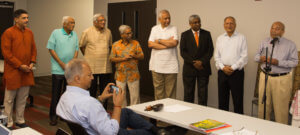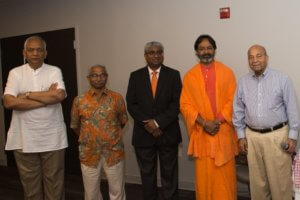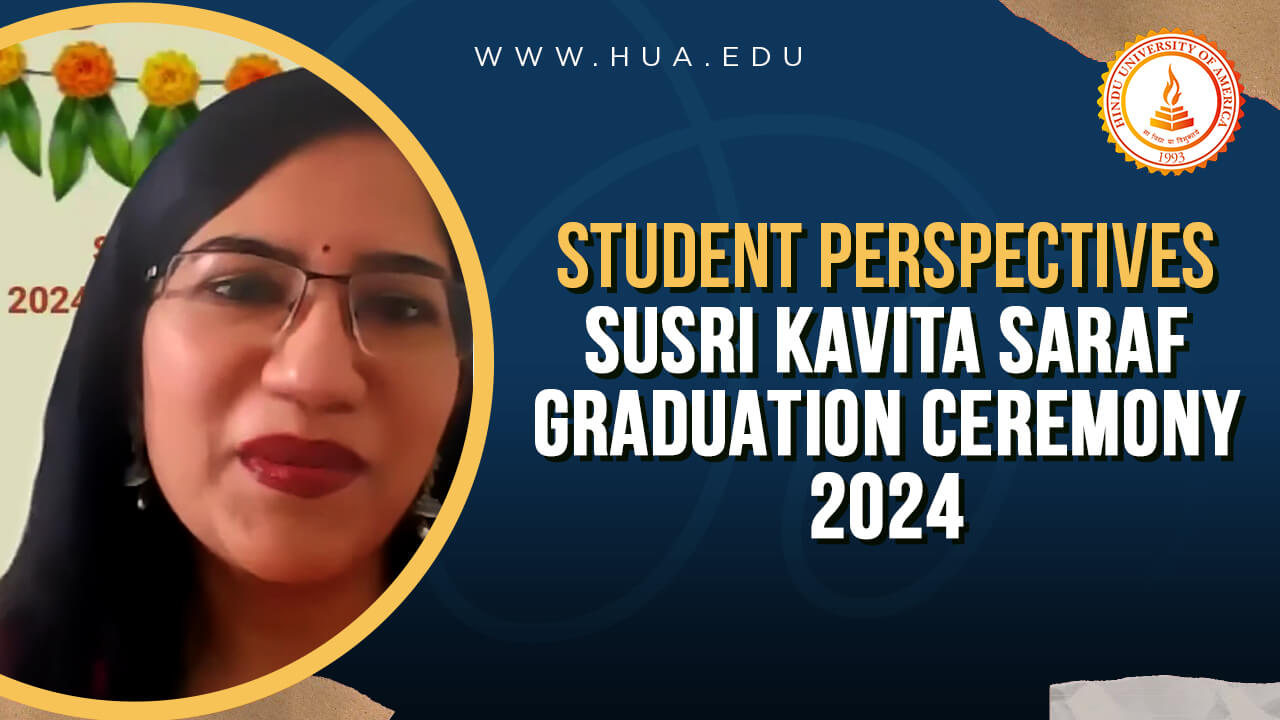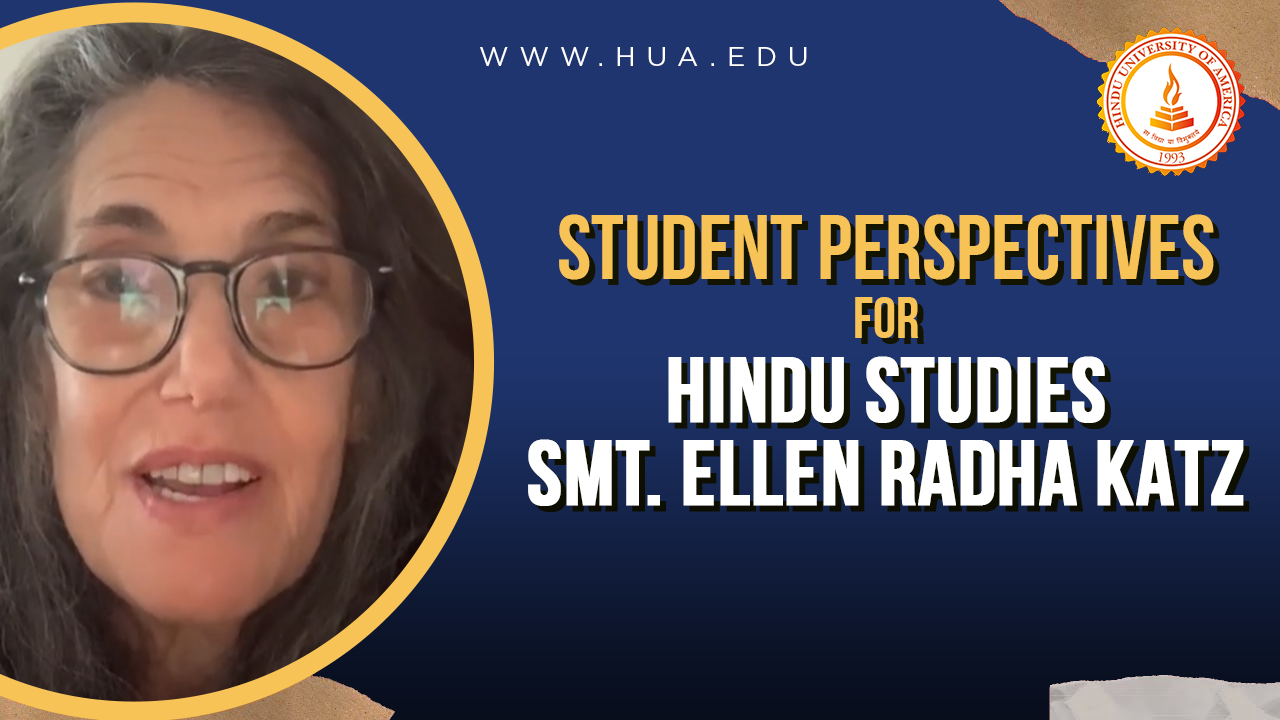Description
Certificate Program in Hindu Studies
Program Code:
CPHS
Course Codes:
100 through 400
Credit Hours:
24 Quarter-Credit-Hours
Duration:
1 – 4 Years
Program Description
The Certificate program in Hindu Studies (CPHS) prepares Students to engage with the world as a Hindu with confidence and clarity. Along the way, it also aims to develop in the student a lifelong love for service and contribution. At the end of the program, students will be informed, empowered, and inspired by the possibilities of living a deeply fulfilled life as a Hindu, and making a real difference in the world. As Students discover the range and depth of Hindu thought, its uniquely awesome cosmology, and clear up some of the misconceptions and erroneous narratives that they have inherited, they will find themselves being profoundly transformed, naturally creating new realms of self-expression, and new possibilities for who they can now be in the world.
Students must take at least 18 Credit hours from the Core Distributions in the Certificate program. They may complete the remaining 6 credit hours by taking any of the courses from the core or elective distributions, completing a total 24 credit hours.
Program Learning Outcomes
Through this Certificate Program, Students will be able to:
- Clarify the Hindu Paradigm
- Articulate the contemporary relevance of Hindu thought
- Apply their learning to think from a Hindu context
- Create new pathways for service, leadership, and global engagement
- Contribute with confidence and clarity, in unique and innovative ways
Who is this Program for:
This Program will be invaluable for all people who are engaged in Teaching, Learning, Community Service, Advocacy, Leadership, Writing, Media, Self-Inquiry and Personal Transformation. People who are engaged in teaching children at community centers and Hindu temples, will benefit immensely from this program. People who were not born in the Hindu tradition but have been drawn to its teachings through Yoga, Kirtan and Meditation will also find this program transformative. People who are already engaged with Hindu activities and want to go deeper into its wisdom, will benefit greatly from the Certificate.
How long will this program take:
Normally, a full time course load is considered 9 credits per quarter. At this rate a student can complete the certificate in 3 quarters. A reasonable course load that is suited for working professionals will be 3 credits per quarter. At this rate, the Certificate can be completed in 8 Quarters i.e., 2 years. Of course, Students may choose to go even slower through the curriculum, and register only for 2 Credits per Quarter. For these students the Certificate will take 12 Quarters i.e., 3 Years. At 4 Credits per Quarter, a Student may finish the Certificate in exactly 6 Quarters. It all depends on how fast a student can go through the Certificate.
Structure of the Program
The certificate program consists of a total of 24 credit hours of coursework. It can be completed at the earliest in 8 quarters, if the students can take 3 Credit hours per quarter, or more slowly over time, in any case, under five years. Students must take at least 18 Credit hours from the Core Distributions in the Certificate program. They may complete the remaining 6 credit hours by taking any of the courses from the core or elective distributions, completing a total 24 credit hours.
X
Certificate Program in Hindu Studies
The tuition fee per credit hour for the CPHS courses is $200. The total cost of the Certificate program with 24 credit hours is $4,800 plus a one time non-refundable administration fee of $100. However, students have the option of signing up for annual payment plans that will reduce the cost.
The following payment plans are available:
Payment Plan Options:
Pay in Full: $3,600 one-time payment.
- 2-Year Payment Plan:$ 1,900 / year for 2 years.
- 3-Year Payment Plan:$ 1,400 / year for 3 years.
- 4-Year Payment Plan:$ 1,100 / year, for 4 years.
- Pay-as-you-go:$ 300 per quarter.
From: $300.00 every 3 months for 48 months and a $100.00 sign-up fee
Before you choose a payment plan, and get enrolled in the Certificate Program in Hindu Studies, please make sure that you have completed the following steps.
1. Applied for the Program.
2. Reviewed the enrollment agreement form.
3. Determined your payment plan.
After all of the above steps have been completed, please choose a payment plan below and pay your fees.
Select a payment plan below:
X
Tuition and Payment
The tuition fee per credit hour for the Certificate Program courses is $200. The total cost of the Certificate program with 24 credit hours is $4,800. However, students have the option of signing up for annual payment plans that will reduce the cost.
The following payment plans are available:
Pay in Full: $ 14,400 one-time payment. Saving of $ 3,600.
- Pay in Full: $3,600 one-time payment. Saving of $1,200.
- 2-Year Payment Plan: $1,900 per year, total of $3,800. Saving of $1000.
- 3-Year Payment Plan: $1,400 per year, total of $4,200. Saving of $600.
- 4-Year Payment Plan: $1,100 per year, total of $4,400. Saving of $400.
- Pay-as-you-go: $300 per Quarter, total of $4800. Full Price.
There is also a one-time administration fee of $100 to be paid initially at the time of enrollment in the program.
X
FBL Examples
Example # 1:
Priya (a hypothetical student) is interested in learning more about her family’s ancestral lineage and in enhancing her knowledge and practice of yoga in India. She lives in the United States and is the mother of a young child, so she will not be able to stay at a Yoga Gurukulam for an extended period of time. Priya has located a particular site for her FBL, which meets the criteria. They understand her responsibilities and have told her that a one or two-week stay at the Gurukulam is sufficient; she is able to manage this. She will participate in online courses with the Gurukulam, before and after her stay and is already thinking about how she can make connections with her HUA coursework in Yoga Sutras of Patanjali and other Yoga related courses.
Example # 2:
Kevin (a hypothetical student) is a musician who has been drawn to the spiritual foundations of Bhakti music. He lives in the USA, and is part of a Performing Arts Orchestra, who has been dabbling with his own musical creations based on the Vedic teachings. He is able to visit India for an extended period of time, and designs a 3-month immersion experience for his FBL with a Partner institution in India, which specializes in Classical Indian Music. He is also simultaneously learning Sanskrit through HUA and will be working on developing a deeper appreciation of the lyrics and their meanings from within a Hindu spiritual context. He will be making connections between his HUA coursework on Sanskrit as well as in Hindu Philosophy with the compositions of the Bhakti saints of various genres through his FBL.
Example #3:
Darshana (a hypothetical student) is interested in understanding the Ashram experience more fully. She is able to spend a substantial amount of time at an Ashram in the United States. She combines that experience with a quick 3-week Ashram tour of India to Rishikesh, Coimbatore and Belur, where she is able to develop an immersive understanding of the Ashram experience across multiple Hindu traditions. Her FBL is managed through the relationship with the Ashram in the USA and is able to also incorporate the 3-week travel to India to visit and experience several Ashrams. Through these varied Ashram experiences, she is able to incorporate new practices in her own life, after experimenting briefly with multiple practices being offered at these various sites.
Courses in the Program
Core Distributions: 18 Credit Hours must be taken from the Core distributions as follows:
Hindu Studies Foundations
- HSF5000 – Orientation to Hindu Studies (Required Course)
- HSF1101 – Svadharma – Discovering and Living our Life Purpose
- HSF1401 – Introduction to the Vedic Ritual
- HSF1402 – Introduction to the Vedic Chanting
- HSF2001 – Introduction to Hindu Philosophy: Shad Darshanas
- HSF2002 – Introduction to Upanishads – Part I
- HSF2003 – Introduction to Upanishads – Part II
- HSF2101 – Dhyanam – Meditation and the Meditator
- HSF2102 – Self-Knowledge and the Quest for Happiness
- HSF2103 – Bhakti – The Heart of Wisdom – 1
- HSF2104 – Bhakti – The Heart of Wisdom – 2
- HSF3000 – Hindu Dharmic Parenting
- HSF3401 – Chanakya’s Leadership Principles for the 21st Century
- HSF4000 – Distinguishing Varna and Jati from Caste
- HSF1000 – Introduction to Hinduism
- HSF1502 – Hindu Samskaras
Hindu Studies Foundations
Texts and Traditions
- TAT1001 – Introduction to the Dasa Shanti Mantras
- TAT1002 – Sadhana Panchakam
- TAT1301 – Vishnu Sahasranama Stotram
- TAT1303 – Lalitha Sahasranamam – Part I
- TAT1304 – Lalitha Sahasranamam – Part II
- TAT1305 – Glory of Sundarkand from Ramcharitmanas – 1
- TAT1306 – Glory of Sundarkand from Ramcharitmanas – 2
- TAT2100 – Across the Universe: Hindu Dharma and Western Creative Arts
- TAT3001 – Dakshinamurti Stotram by Adi Shankara
- TAT3104 – Hindu Temples and Traditions
- TAT3201 – Sankhya Darshana through the Sankhya Karika – Part 1
- TAT3202 – Sankhya Darshana through the Sankhya Karika – Part 2
- TAT3203 – Vedantasara of Sadananda Part 1
- TAT3204 – Vedantasara of Sadananda Part 2
- TAT3206 – Nyaya Darshana – Part 1
- TAT3207 – Nyaya Darshana – Part 2
- TAT3208 – Vaisheshika Darshana Part 1
- TAT3209 – Vaisheshika Darshana Part 2
- TAT3210 – Mimamsa Darshana – 1
- TAT3211 – Mimamsa Darshana – 2
- TAT3212 -Tattvabodha – Part 1
- TAT4000 – Adhyasa Bhashya of Adi Shankara
- TAT4004 – Kenopanishad with Shankar Bhashya – Part 1
Yoga Studies
- YOG2001 – The Yoga of the Bhagavad Gita
- YOG2002 – The Yoga of the Yoga Sutras
- YOG2100 – An Immersive exploration of the iconic “Autobiography of a Yogi”
- YOG3100 – The Yoga of Mahabharata
- YOG3300 – The Yoga of Motherhood
- YOG3301 – Mother womb: Engaging the Divine Feminine
- YOG3302 – Yoga of Relationship
Ayurveda and Integrative Health
- AIH1001 – Ayurveda – Essential Nutrition
- AIH1002 – Ayurveda: The art of Cleaning Fasts and Detox diet for Healthy Living
- AIH1003 – Ayurvedic First Aid and Home Remedies
- AIH1004 – The Ayurvedic Guide to Women’s Wellness
- AIH1005 – Swasthavritta – Ayurveda for Daily Wellness
- AIH1006 – Glow and Flow with Ayurvedic Oils
- AIH1100 – Becoming an Ayurvedic Health Counselor
- AIH1101 – Ayurveda 101 : Wisdom of Wellbeing
- AIH2001 – Ayurveda – Advanced Nutrition
- AIH2002 – Ayurveda: Therapeutic Cooking for Healthy Living
- AIH2101 – Ayurveda and Skin Science: The Skin-Health Connection
- AIH2200 – Ayurveda Wellness Retreat & Practicum
History and Methods
- HAM2100 – How Hindu Dharma transformed America
- HAM2101 – Gurus in America- The incredible impact of India’s Dharmic Ambassadors
- HAM4100 – Rivers of Rigveda
- HAM4201 – Reconstructing Hindu History – The Commissions
- HAM4202 – Reconstructing Hindu History – The Omissions
- HAM4203 – History and Methods of Indian Astronomy
CPHS Elective Courses – The remaining 6 credits required to complete the CPHS program may be taken from any group of courses from the Core Distribution areas listed above, or from the courses listed under the Community Education Program.
Elective Distributions: (The remaining 6 credits can be taken from this distribution)
Hindu Studies Foundations
- HSF1005 Lessons from Valmiki Ramayana
- HSF1006 Lessons from Valmiki Ramayana for Teens and Parents
- HSF1007 Discover the contemporary relevance of Hindu Dharma
- HSF1010 Growing Up with the Gita
- HSF1301 Deha – The Principles of Sound Body in Bhagavad Gita
- HSF1302 Gnana – The Principles of Sound Mind in Bhagavad Gita
- HSF1303 Yoga – The Principles of Pure Soul in Bhagavad Gita
- HSF1304 Bodhak – The Gita Vidya Teacher Training
- HSF1403 Experiencing Shiva
- HSF1404 Experiencing Vishnu
- HSF1405 Experiencing Devi
- HSF1406 Experiencing Ganapathi
- HSF1407 Experiencing Aditya
- HSF2201 Understanding Hinduphobia
- HSF3001 Upanishadic Dialogues – I: The Chandogya Upanishad
- HSF3101 The Renaissance of Sanatana Dharma in the Light of Sri Aurobindo
- HSF3102 The Renaissance of Sanatana Dharma in the Light of Sri Aurobindo – Part 2
- HSF3103 The Renaissance of Sanatana Dharma in the Light of Sri Aurobindo – Part 3
- HSF3104 Sri Aurobindo and Sanatana Dharma
- HSF3301 Ramayana for Excellence in Management and Leadership
- HSF4100 Women in Hinduism
- HSF5011 Discover Dharma – A Study Tour in India
- HSF5012 Western Intellectual History – A Study Tour in Europe
Texts and Traditions
- TAT1101 Life Lessons from the Hindu Puranas
- TAT1201 Sri Ramcharitmanas: Continuity in Change
- TAT1302 Bhaja Govindam – A Topical Approach
- TAT2200 Singing Bhakti Music: From Saints to Synthesizers
- TAT3101 Ragas in Shastriya Sangeet and Modern Music
- TAT3102 The History of Shastriya Sangeet
- TAT3103 Indian And Western Music Traditions – A Comparative Study
- TAT3205 Understanding the Vedas
- TAT4001 Advaita, Vishishtadvaita, Dvaita, – The three flavors of Vedanta Sastra
- TAT4002 The Three Vedantic Perspectives on the Bhagavad Gita
- TAT4003 The Three Vedantic Perspectives on Isha Vasya Upanishad
Yoga Studies
- YOG1000 Holistic Yoga – Philosophy and Practice
- YOG2000 Holistic Yoga – Deepening your practice
- YOG2101 Ahimsa and the Art of Non-Violent Communication
- YOG2201 Chakra Healing
- YOG3002 Teaching Holistic Yoga Retreat
- YOG3003 Internship and Practicum in Teaching Holistic Yoga
- YOG3101 Antaranga Mandapam
- YOG3401 Decolonizing Yoga
- YOG4000 Master Class in Yoga
Ayurveda and Integrative Health
Program Context
Being successful in our professional lives, as a Doctor, Engineer, Business person, Entrepreneur, or a Lawyer and so on, equips us with a basic ability to compete effectively in the contemporary economy, to survive and succeed in the world. But it does not necessarily address a deeper dimension of human possibility i.e., the spiritual or the Adhyatmika realm. In each of us lies dormant a need and a desire for deeper engagement with the world, to contribute, to make a difference and be of service in a profound and meaningful way. In each of us lies as yet unfulfilled the potential for leadership and global impact, sometimes even as yet unimagined. In every one of us without exception there lies the possibility of going within, exploring the realms of deeper levels of consciousness, and transforming our connection and relationship with the cosmos itself, manifesting the perfection and possibilities that already lie within us. These are the realms of Dharma and Moksha, the unique dimensions of Hindu thought.
What is the purpose of our human existence? Does it have one? What does it mean to live a successful life? What is the source of deep fulfillment and contentment in our lives? What is Dharma? What is our Svadharma? How do we ensure that we fulfill the unique purpose and opportunity of our lives? How do we even discover it? Have we exhausted the possibilities of being alive already? How has Hindu Dharma addressed these questions?
In the Certificate Program in Hindu Studies, Students will engage with these questions in a deep and authentic way, as they prepare themselves for service, leadership, and contribution, and for making a deep and lasting impact in the communities in which they live, as well as the world in general. Whether you are interested in writing, speaking, and teaching, in counseling and healing, in social work, media or the performing arts, in education and curriculum development, in providing leadership in your communities, working with youth or in inter-faith domains, or simply engaging with schools and colleges, and the institutions of our contemporary world, or being of service in some other vital way, the Certificate Program in Hindu Studies, will empower and enable you in your life’s journey.
This program will take work, commitment, and the ability to sustain your interest through several quarters. But what you will accomplish at the end, who you will become in the process, and all the new aspirations and possibilities that you will create for yourself, that you didn’t even know that you had, will transform you in an amazing and inspiring way. You will go beyond your real or perceived limitations, capacity and capabilities, and may even sustain and nurture the continued relevance of Sanatana Dharma for posterity as its ambassador.
















